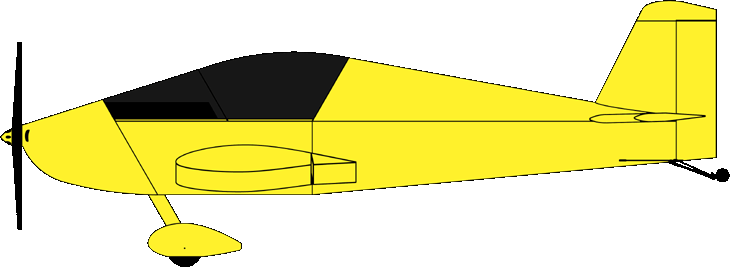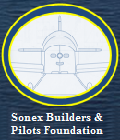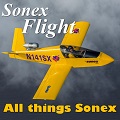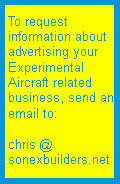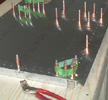

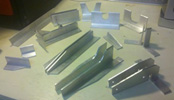
random user submitted photo
CHT troubles-looking for possible solutions
9 posts
• Page 1 of 1
CHT troubles-looking for possible solutions
I've read through some of the threads here about CHT/EGT issues. I've tried pretty much everything I read about so far with no luck. I figured I'd check here before I seek help from Sonex tech support because I know some of you have dealt with similar issues. My rear cylinders, especially my right rear cylinder (3#), get too hot any time I climb. Even on cool 50 degree mornings, I can't climb more than 1000 feet after takeoff before my #3 cylinder CHT hits 425. It has jumped to 450 a few times briefly until I leveled off and throttled back a tad. My left rear (#1) cylinder gets up to 425, but at least doesn't go over like #3 (although maybe it would if I tried to keep a climb going.) I still hit those temps while climbing at 85-90 mph. On 70 degree days, my CHTs are spiking like that by the time I make it 700 feet above ground. My front cylinders do great (usually around 375 during climb), and my rear cylinders do just fine while in cruise at 3100-3200 RPMs. During climb at WOT, I'm usually seeing 3000 RPMs and density altitudes have been between 500-1500 feet when I'm getting these readings. Leaning my mixture hasn't made any difference in my CHTs, just my EGTs a bit. During my climb when I'm seeing the high CHTs, my EGTs are reading between 1050-1150 depending on how much I lean my mixture. Once I cool off a bit after I reach pattern altitude, I can maintain CHTs of 415 and under for the rear cylinders if I climb at 100 mph, at a rate of only about 100 ft/min, without being WOT, and this is while I was flying solo with full fuel (935 lbs total weight at takeoff).
Just to give you an idea of my set-up, I have an early model Aerovee (serial #250) that was build precisely per the manual. The builder was meticulous, so I'm sure it was done correctly. The front CHT probes are mounted just beside the spark plugs (the hold drilled into the heads like recommended), but the rear cylinder probes measure directly from the spark plugs. I'm not sure if this is making the rear cylinders read hotter than they actually are, but the slight sputtering I experienced when I first bought the plane and noticed this while trying to climb 3000 feet steadily seems to suggest a possible pre-ignition of the fuel in the cylinder making it rough for a couple seconds. That would be consistent with tempts that are too high. The Sonex air baffling kit was installed and has a snug fit around the cylinders to guide the air through the cylinder fins. I tried decreasing the oil level a bit (I thought it was possibly overfilled a tad), increased the oil level to just higher than it was when I purchased the plane, none of which made a difference. The oil cooler inlet (bottom mounted oil cooler) was mostly closed off (it is now a small circle about 2" in diameter), and my oil temps are consistently 185-195. I opened up the exhaust opening/outlet in the bottom of the cowling and have almost doubled the size of the opening (probably about 9" x 10" opening now). I even tried switching to the NGK plugs that I've seen mentioned hoping to get a little more even and consistent fuel burn. The only change I made that helped a bit was opening up the exhaust outlet, which kept it from spiking up to 450, but it hasn't given me the ability to climb steadily unless at only 100 ft/min. I know other Aerovee owners have had great success with no issues, so I'd really like to hear from anyone who has ideas about what I can do to try to gain the normal performance that my plane should have.
Just to give you an idea of my set-up, I have an early model Aerovee (serial #250) that was build precisely per the manual. The builder was meticulous, so I'm sure it was done correctly. The front CHT probes are mounted just beside the spark plugs (the hold drilled into the heads like recommended), but the rear cylinder probes measure directly from the spark plugs. I'm not sure if this is making the rear cylinders read hotter than they actually are, but the slight sputtering I experienced when I first bought the plane and noticed this while trying to climb 3000 feet steadily seems to suggest a possible pre-ignition of the fuel in the cylinder making it rough for a couple seconds. That would be consistent with tempts that are too high. The Sonex air baffling kit was installed and has a snug fit around the cylinders to guide the air through the cylinder fins. I tried decreasing the oil level a bit (I thought it was possibly overfilled a tad), increased the oil level to just higher than it was when I purchased the plane, none of which made a difference. The oil cooler inlet (bottom mounted oil cooler) was mostly closed off (it is now a small circle about 2" in diameter), and my oil temps are consistently 185-195. I opened up the exhaust opening/outlet in the bottom of the cowling and have almost doubled the size of the opening (probably about 9" x 10" opening now). I even tried switching to the NGK plugs that I've seen mentioned hoping to get a little more even and consistent fuel burn. The only change I made that helped a bit was opening up the exhaust outlet, which kept it from spiking up to 450, but it hasn't given me the ability to climb steadily unless at only 100 ft/min. I know other Aerovee owners have had great success with no issues, so I'd really like to hear from anyone who has ideas about what I can do to try to gain the normal performance that my plane should have.
Tom Hilsdorf
N37YX
Dayton, OH
N37YX
Dayton, OH
-

Titanium Cranium - Posts: 59
- Joined: Mon Apr 24, 2017 11:28 pm
Re: CHT troubles-looking for possible solutions
I tried all the things you mentioned too and only the opening of the bottom exit and fences on the intake helped. The biggest reduction was getting the electronic ignition advance set correctly. That dropped cht's 20+ plus degrees. The other big change came at about 35 hours total time, the engine was broken in and the temps started going down to upper 300's on a hot day climb. Since adding the turbo charger the heads are cooler and more even in cruise. I think it is due to better fuel mixture balance between front and rear and possibly due to better cooling from higher airspeed.
to check the ignition fly straight and level for five min. or so and the CHT's temps have stabilized the shut off the electronic ignition and fly for another five min or so and see if the head temps drop. If they do then start making small adjustments to the ignition trigger magnet until there is no temperature difference.
to check the ignition fly straight and level for five min. or so and the CHT's temps have stabilized the shut off the electronic ignition and fly for another five min or so and see if the head temps drop. If they do then start making small adjustments to the ignition trigger magnet until there is no temperature difference.
Last edited by wlarson861 on Wed May 31, 2017 12:22 am, edited 1 time in total.
Bill Larson
N861SX
Sonex, polished, tail wheel, Generation 4 Jabiru 3300
N861SX
Sonex, polished, tail wheel, Generation 4 Jabiru 3300
- wlarson861
- Posts: 499
- Joined: Wed Dec 05, 2012 11:41 pm
Re: CHT troubles-looking for possible solutions
Other builders have mentioned that reading at the spark plug makes a big difference. I don't remember the exact number, but a little over 20 degrees wouldn't surprise me.
When you pull the mixture back while climbing, do you get a slight but noticeable increase in RPM? Just checking that your mixture is tuned a little rich of peak. I feel like if you get this, your problem is unlikely to be a mixture problem. Your RPMs, airspeeds, and climb rates sound pretty reasonable, but 100fpm at 100mph seems a little low at that weight. I don't have an exact number, but I'd expect 250fpm or more. My EGTs are also typically closer to 1400 when I lean to where I get a touch of occasional roughness.
Have you gone through the secondary ignition timing procedure? What happens when you turn off the secondary ignition?
Sounds like your baffles are fine. I'd still double-check them. I've flown mine enough that there is a black line on the inside of the cowl where the baffle touches. There's also a few spots where I can tell from the mark that air is leaking past. I don't normally need to monitor temperatures unless maybe when it's around 100F outside, but if I did, fixing those leaks would be my first attempt.
Another thing worth checking is whether the instrument monitoring your CHTs is calibrated correctly. Is the correct thermocouple type selected?
When you pull the mixture back while climbing, do you get a slight but noticeable increase in RPM? Just checking that your mixture is tuned a little rich of peak. I feel like if you get this, your problem is unlikely to be a mixture problem. Your RPMs, airspeeds, and climb rates sound pretty reasonable, but 100fpm at 100mph seems a little low at that weight. I don't have an exact number, but I'd expect 250fpm or more. My EGTs are also typically closer to 1400 when I lean to where I get a touch of occasional roughness.
Have you gone through the secondary ignition timing procedure? What happens when you turn off the secondary ignition?
Sounds like your baffles are fine. I'd still double-check them. I've flown mine enough that there is a black line on the inside of the cowl where the baffle touches. There's also a few spots where I can tell from the mark that air is leaking past. I don't normally need to monitor temperatures unless maybe when it's around 100F outside, but if I did, fixing those leaks would be my first attempt.
Another thing worth checking is whether the instrument monitoring your CHTs is calibrated correctly. Is the correct thermocouple type selected?
- gammaxy
- Posts: 601
- Joined: Wed Sep 04, 2013 9:31 am
Re: CHT troubles-looking for possible solutions
Shot in the dark but are the supertin baffles under the cylinders installed? I think they were part of the original kit and not in the fence baffle kit.
Keith
Keith
- kmacht
- Posts: 772
- Joined: Tue Jun 21, 2011 11:30 am
Re: CHT troubles-looking for possible solutions
Do you have a lip in front of the cowl exit? At higher angles of attack in climb having the lip in front of the cowl exit area can lower pressure immediately behind it at the exit and increase airflow through the cowl. As you increase angle of attack the airflow through the cowl can lower as pressure increases at the cowl exit. Just a thought.
Jeffrey W
Waiex 0196
AeroVee Turbo
Waiex 0196
AeroVee Turbo
- jeff0196
- Posts: 44
- Joined: Mon Mar 13, 2017 10:16 pm
- Location: SE Wisconsin
Re: CHT troubles-looking for possible solutions
Retarding the secondary ignition, plus installing the rear CHT probes in the cylinder heads, and not under the spark plugs, would be the two simplest new things to try. Getting the secondary timing right did a LOT for my temps. But you can't go by the numbers on the ground; you need to be in flight, per the AeroVee manual.
Do you have EGT probes? If so, just wondering if you see a spread there, or if they are relatively consistent with one another.
Do you have EGT probes? If so, just wondering if you see a spread there, or if they are relatively consistent with one another.
Mike Smith
Sonex N439M
Scratch built, AeroVee, Dual stick, Tail dragger
http://www.mykitlog.com/mikesmith
Sonex N439M
Scratch built, AeroVee, Dual stick, Tail dragger
http://www.mykitlog.com/mikesmith
- mike.smith
- Posts: 1430
- Joined: Tue Jan 29, 2013 8:45 pm
Re: CHT troubles-looking for possible solutions
I checked the inside of my cowling to see how well the baffle/fence kit seals up, and it seals up pretty well. There are only a few inches of area that look as though they aren't really tight against the cowling. I do have the lip still installed in front of the air exit on the bottom of the cowling. When I increased the size of the opening, I extended the opening forward and maintained the original width specifically to keep those lip pieces, as I figured those help to create low pressure to aid in air flow through the cowling. Also, the supertin baffles are installed on the engine and everything seems to have a nice fit with no more than 1/4" between the baffles and the cylinder fins.
I got up for a few hours Saturday morning to see what effect the secondary ignition might be having on my temps. When I turned off the electronic ignition in straight and level flight, I saw my temps decrease only about 5-8 degrees at 3000 ft MSL. I watched my EGTs and saw no more than a 20 degree spread, with my left EGT being slightly higher than my right EGT (I have only two EGT probes, one for left cylinders, and one for right). I thought this was interesting because it's my right rear cylinder that is getting the highest CHT reading (I do have 4 probes for CHTs). I'll try moving the rear CHT probes to the head instead of the spark plugs to compare the readings, but I'll have to get the sealant to remove and re-install the intake manifolds as those will need to come off in order to drill the new holes for the probes. I probably won't get much done on that for a week or two though, because I have a paint job to complete on a friend's car before I'll have the spare time to get out to the hangar. I'll keep you all posted on what difference I get in readings when I move the CHT probes when I can get around to it. If that doesn't help the CHTs enough, I might fabricate a larger lip for the air exit in the bottom of the cowling to see if that helps.
I got up for a few hours Saturday morning to see what effect the secondary ignition might be having on my temps. When I turned off the electronic ignition in straight and level flight, I saw my temps decrease only about 5-8 degrees at 3000 ft MSL. I watched my EGTs and saw no more than a 20 degree spread, with my left EGT being slightly higher than my right EGT (I have only two EGT probes, one for left cylinders, and one for right). I thought this was interesting because it's my right rear cylinder that is getting the highest CHT reading (I do have 4 probes for CHTs). I'll try moving the rear CHT probes to the head instead of the spark plugs to compare the readings, but I'll have to get the sealant to remove and re-install the intake manifolds as those will need to come off in order to drill the new holes for the probes. I probably won't get much done on that for a week or two though, because I have a paint job to complete on a friend's car before I'll have the spare time to get out to the hangar. I'll keep you all posted on what difference I get in readings when I move the CHT probes when I can get around to it. If that doesn't help the CHTs enough, I might fabricate a larger lip for the air exit in the bottom of the cowling to see if that helps.
Tom Hilsdorf
N37YX
Dayton, OH
N37YX
Dayton, OH
-

Titanium Cranium - Posts: 59
- Joined: Mon Apr 24, 2017 11:28 pm
Re: CHT troubles-looking for possible solutions
While I was doing my first valve adjustment and oil change a few weeks ago, I did a few things to address the high CHT readings I was getting. I moved my CHT probes for the rear cylinders from the spark plugs to the recommended location on the cylinder heads. I also installed a K&N air filter that some have recommended. When I changed the oil, I switched from the recommended Penzoil 20W50 to the Valvoline VR1 20W50 that Sonex also approves of. My oil temp readings actually increased from about 190-195 up to 200-205, but after all the changes, my CHTs are pretty much perfect now. Before, I was typically seeing my CHTs spike within 30-45 seconds after takeoff while climbing at only 100 feet/min, at 100 mph, and after throttling back a bit. Under the same conditions, I am now able to climb at WOT and get about 500-600 feet/min at 80 mph with my CHTs never going over 400, and I've been seeing a temp spread between all cylinders of only about 20-25 degrees. I'm pretty excited about this as I'm hoping to do a lot of traveling with my Waiex and I feel much more comfortable now with the idea of traveling longer distances from home.
Tom Hilsdorf
N37YX
Dayton, OH
N37YX
Dayton, OH
-

Titanium Cranium - Posts: 59
- Joined: Mon Apr 24, 2017 11:28 pm
Re: CHT troubles-looking for possible solutions
Titanium, I'm having the same issue as you with my left chts shooting through the roof.
They used to be fine until I installed a new empi head on that side. I see 420 to 450 if I'm not careful and climb at wot 3200 rpm and about 80 mph. The other side is right as rain. I did notice that there's seems to be a lot more air hitting the cool side from the prop. Could be the Dynamics from the prop, who knows.
I took cowlings off and did some measurements and the left side just seems to run hotter everywhere by about 20 to 30 degrees. She's pretty good at straight and level at 120 and 1900 rpm in that it sinks below 400 just fine, but climbing is tenuous with those temp climbs.
They used to be fine until I installed a new empi head on that side. I see 420 to 450 if I'm not careful and climb at wot 3200 rpm and about 80 mph. The other side is right as rain. I did notice that there's seems to be a lot more air hitting the cool side from the prop. Could be the Dynamics from the prop, who knows.
I took cowlings off and did some measurements and the left side just seems to run hotter everywhere by about 20 to 30 degrees. She's pretty good at straight and level at 120 and 1900 rpm in that it sinks below 400 just fine, but climbing is tenuous with those temp climbs.
- xymox
- Posts: 26
- Joined: Tue Sep 27, 2016 2:24 pm
9 posts
• Page 1 of 1
Who is online
Users browsing this forum: No registered users and 17 guests
